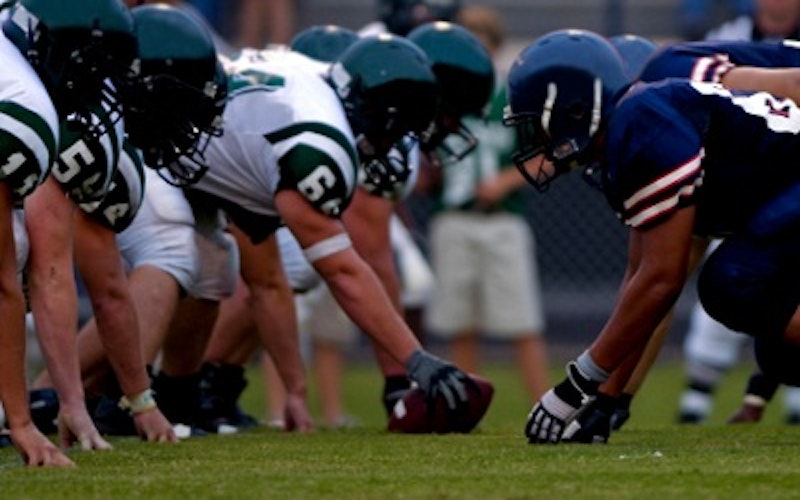
Culture At Large
Football season and our obsession with safety
I love football. Each fall, I look forward to Sunday afternoons with my husband, watching our beloved Denver Broncos grit their way through the professional season. But I love college football more. I grew up in Nebraska, where the whole state halts for a few hours on Saturdays and the population inside Memorial Stadium makes it the third-largest city in the state.
This year, leafing through the Sports Illustrated college football preview and eagerly waiting for what Peyton Manning will accomplish with the Broncos, I have reservations. The sport is battered by recent scandal and statistics. Atrocities at Penn State. Junior Seau’s shocking death. New Orleans’ brutal “bounty system.” Revelations of brain damage to longtime players. National unease over a game that just is not safe.
The truth is, football has never been safe. While we might have new evidence regarding the extent of the damage to players, we are not discovering this truth for the first time. What fans love about football – the drama, the unpredictability, a clash of strength on strength - is not safe. It’s risky, and that’s one reason so many people love a sport so often used as a metaphor for life. High risk, high reward.
In life, as in football, perfect safety is impossible. Yet we seem obsessed with trying. This wave of concern over football’s risks is part of a societal obsession with safety. Layer upon layer of insurance. Warning labels on everything. Security systems, metal detectors and cameras. Tamper-safe packaging. Seatbelts for dogs. Hand-sanitizer dispensers next to the bathroom sink. We believe we should be able to keep everyone safe and we assume safe is the ideal way to live.
In life, as in football, perfect safety is impossible. Yet we seem obsessed with trying.
But we forget: with little risk comes little reward.
Safety is important. All lives are valuable. And risk for the sake of risk is … well, stupid. But sometimes, if you want to do something that matters, you have to give ground on safety.
Ironically, with our children we celebrate heroes of our faith who took great risks in service to God: Abraham, Noah, Esther, Mary, Abigail, David, Ruth, Paul. Then we make sure those same children are wearing helmets and pads and carrying a cell phone every time they leave the house. We teach teenagers about Jim Elliot and friends, Billy Graham, Amy Carmichael and Mother Theresa, but make sure their own outreach experiences happen in a very controlled environment.
Jesus never told us to pursue safety. In fact, he warned against living for our own longevity: “If you try to hang on to your life, you will lose it. But if you give up your life for my sake, you will save it” (Luke 9:24). “If you love your father or mother more than you love me, you are not worthy of being mine,” he warned. “If you love your son or daughter more than me, you are not worthy of being mine” (Matthew 10:37).
Paul knew about this. “Everything else is worthless when compared with the infinite value of knowing Christ Jesus my Lord. For his sake I have discarded everything else, counting it all as garbage, so that I could gain Christ and become one with him” (Philippians 3:8-9a). How many of us are living for what is essentially worthless garbage?
True life is an inherently unsafe activity. As Christians, when we value our own safety above God’s mission for us, we fail the mission. We must be willing to risk ourselves for the sake of God’s greater purpose. This is not because our lives aren’t worth protecting, but because true life begins when this life has run its course. Why not spend this one well?
What Do You Think?
- Can Christians be too concerned about safety?
- What part should fear play in your faith?
- Do the dangers related to football make it a thrilling sport or an untenable one?
Topics: Culture At Large, Arts & Leisure, Sports, Theology & The Church, Faith